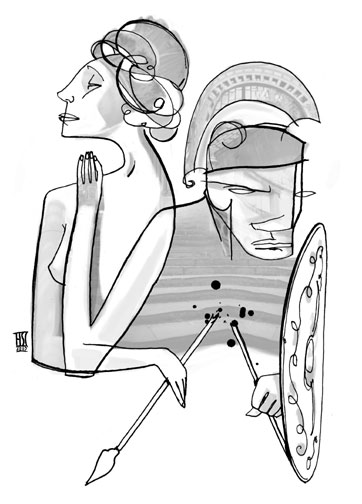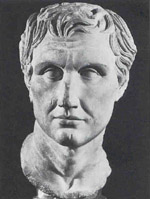 |
|||||
|---|---|---|---|---|---|
Gender in Greek Comedies
This first scene is where we begin to see the first portrayal of women, that they are deceitful beings. Lysistrata’s great plan for getting the men home is that all the women should refuse sex to their husbands. While the women refuse the plan at first Lysistrata eventually assures the women that refusing sex is the only way to make peace happen. She states, “If we sat around at home all made up, and walked past them wearing only our see-through underwear and with our pubes plucked in a neat triangle, and our husbands got hard and hankered to ball us, but we didn’t go near them and kept away, they’d sue for peace, and pretty quick, you can count on that!” (“Lysistrata” 48) When the women protest and say their husbands will force them to have sex she replies, “Submit, but disagreeably: men get no pleasure in sex when they have to force you. And make them suffer in other ways as well” (“Lysistrata” 49). It is clear to see from these passages that Lysistrata is a smart woman who knows how to get what she wants. She is deceitful and clever; deceitful because she wants the women to make their men nice and hot and clever because she knows that by refusing sex the men will give into anything. Lysistrata is also cunning and deceitful in the way she and the women take over the Akropolis, “The older women are assigned that part: while we’re working out our agreement down here, they’ll occupy the Akropolis, pretending to be up there for a sacrifice” (“Lysistrata” 49). It is here that the women, especially Lysistrata, fall into that stereotype that women are deceitful and mischievous. She tells the women to lie about their true intentions on the Akropolis and she uses the refusal of sex as a way to get what she wants. The best example of how far their willing to go to be deceitful appears when Kinesias comes to see his wife Myrrhine. Kinesias has come for sex and Lysistrata lets Myrrhine see him once she has promised not to give it to him. Myrrhine comes out and misleads her husband by getting a cot, then a mattress, then a pillow, then a blanket, and then some scent, all the while Kinesias’ desire is growing to the point of it being unbearable. While he fiddles with the blanket, Myrrhine dashes off and Kinesias is left horny and alone (“Lysistrata” 70-75). The second portrayal of women in this play is quite the opposite of the first. The greatest example of this second portrayal happens during the onstage debate. This is the scene where Lysistrata and the Magistrate are arguing over what the women are doing holding the Akropolis. The magistrate firsts asks Lysistrata why she has taken charge of the Akropolis to which Lysistrata replies that the women are going to control and manage the money. The magistrate is furious because in the ancient world women were not allowed to take part in public affairs, especially money. Lysistrata replies back to him “What’s so strange in that? Don’t we manage the household finances for you already?” (“Lysistrata” 59) It is here that she takes a stand for herself saying how the men always make foolish decisions and whenever a woman tried to give advice she was beaten. Lysistrata boldly states that she will no longer be silent and watch men act unwisely, the women will now be the ones calling the shots and the men will be silent (Lysistrata 60-61). It is here that the roles have been reversed and Lysistrata is now the strong manly character while the magistrate is the weaker womanly character. Lysistrata breaks out of the typical womanly character because she not only claims that women can handle the public finances but she also speaks up and tells the magistrate what he and the other men do wrong. It was unheard of in ancient Greece for a woman to act in such a manner. Her intelligence is shown when she gives her speech about how the government should be run on pages 62 and 63. She states that the government should be run in the same manner that wool is made, clean out the bad people and add in a mixture of all the good people; including resident aliens, foreign friends, and anyone who owes money to the treasury. Lysistrata’s idea of letting everyone be a part of the government is bold and outrageous because only free born citizens were allowed to participate in the government. Her view is different; she wants everyone to be at peace with each other and for everyone to be equal. She is a leader because she is faced with a situation that she doesn’t like and she changes it. She’s an interesting character because we can call her a leader and a brave woman but one could argue about the legitimacy of that because of the way in which she went about getting what she wanted. She was deceitful and she used tricks to get her way. She made the women promise to refuse sex to their husbands and she also had them lie about holding a sacrifice in order to secure the Akropolis. Lysistrata is both the stereotypical woman and something new. She is an important character because out of all the Greek plays we read, she is the only female cast as the comic hero.
Words such as “lunatic” and “maniac” are also used throughout act one to describe Knemon. We even get a scene where Knemon drives off a slave by throwing rocks and pears at him. Knemon is not portrayed as a poor man and even though he has some money he refuses to let anyone help him work his land. He also has no interest in politics or anyone except himself. This is not typical behavior of an Athenian male; in fact, Knemon is as far away from a typical proper male that you can get. It is not until act four when Knemon falls down and is rescued by Gorgias that he sees the error in his ways. Knemon admits that he has been living his life the wrong way and that perhaps you do, in fact, need others in your life. However, Knemon states that he is too old and to comfortable in his ways to change. Knemon tries desperately to remain an outsider in society but in the end he fails when Getas and Sikon drag him into the temple for the festival. The other main male role in this play is the character of Sostratos. Sostratos is the comic hero and an all around nice guy. His intentions for marrying Knemon’s daughter are pure and he is willing to prove his love for her. Sostratos even goes as far as to do hard labor in the fields just to impress Knemon. By continuing to be a nice guy, Sostratos gets what he wants in the end and marries Knemon’s daughter. Knemon’s daughter had a very small role in this play. Her character was both important and unimportant. We believe it was unimportant because Menander didn’t’ even bother to name her. He just calls her ‘a girl.’ Her role is important because she is the driving force behind Sostratos. If she wasn’t in the play the comic hero would have nothing to go after. The other female role in this play is the character Simiche. Simiche is the servant of Knemon and while she has a larger role than his daughter it isn’t necessarily a better role. Simiche is portrayed as clumsy and dumb when she drops the bucket down the well and then tries to use the mattock to get it and drops that down the well also. She is also often times crying during her lines because of the things that she has done. One could argue that her role is important because if she hadn’t dropped the bucket and mattock down then well Knemon would never have fallen in which would have resulted in him never realizing that he was wrong and Sostratos would never have gotten the girl. On that point, Simiche has an essential role in the play and helps the plot move along.
Aristophanes. Lysistrata. Miller, Norma, trans. Menander Plays and Fragments. London: Penguin Books, 1987.
|
|||||
For questions or comments, please contact John Gruber-Miller |
|||||

